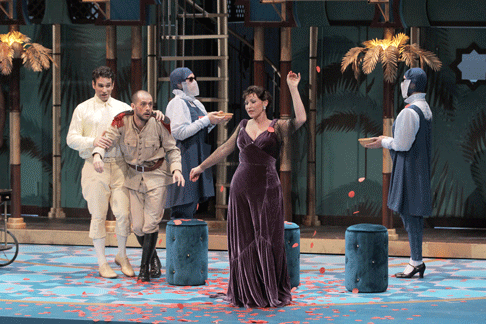So a new production of this first flower of Rossini’s comic maturity was very welcome news.
In recent years the Rossini Festival at not-too-far-away Pesaro has focused on very early and very late Rossini, from the first silly commedia dell’arte farces that manage a trio or quartet once in awhile to the mature comedies that are dramatically so complex that the comedy genre collapses into grand act finales of septets at the minimum, with internal quintets and sextets that further complicate relationships. L’Italiana manages a modest sextet to close the first act and allows the pappataci quartet to grow to a brief sextet at the opera’s end. The extended, masterful sextet finales of Il barbiere will arrive three years later.
There was the wonderful just now in Marseille. Italian conductor Giuliano Carella was in the pit. This fifty-seven year old maestro, music director of the OpÈra de Toulon and frequent guest in Marseille and Monte Carlo, is one of the treasures of opera in the south of France. As well he makes the rounds of the more prestigious European stages for the bel canto repertory, not to mention the Bellini Festival in Catania.
That he is a master Rossinian as well was apparent from the first moments of Rossini’s overture — an unrushed fleetness, a lightness that would lead anywhere, like the witty interplay of the oboe and piccolo that made you feel the pure joy of making music.
Then the singing, the repeated ragings of an Algerian emir named Mustafa (fed up with a clinging concubine) where the maestro’s ample tempos allowed magnificent fioratura to rip forth. And it all came together in the end with the zany quartet in which Mustafa is made a pappataci (it’s a joke, no one, most of all Mustafa, is sure what a pappataci is), the plot complexities became musical complexities, the confusion became total and the maestro brought it all together into a joyful froth that was pure music. The great Rossini.
 FrÈdÈric Antoun as Lindoro, Alex Esposito as Mustafa and Marie-Ange Todorovitch as Isabella
FrÈdÈric Antoun as Lindoro, Alex Esposito as Mustafa and Marie-Ange Todorovitch as Isabella
And there was the weird. French mezzo-soprano Marie Ange Todorovitch was the Isabella. Mme. Todorovitch is one of the treasures of the OpÈra de Marseille, recently in Henri Sauguet’s Chartreuse de Parme as Stendhal’s splendid Dutchess of Sanseverina inappropriately in love with her young nephew Fabrice, as the cowardly Mother Marie in Poulenc’s Dialogue of the Carmelites, and upcoming as Clytemnestra in Elektra. So it was a huge stretch to embody Rossini’s sex-bomb Isabella (role debut apparently) even though Mme. Todorovitch’s roles have included about everything else in her long career.
Mme. Todorovitch possesses a large, roundly mature mezzo-soprano voice with, therefore, minimal flexibility though she did manage a bit of fioratura at mezza voce. Her needed effort to do so deprived Rossini of the joyful unleashing of florid technique that make these passages sheer musical delirium. Unfortunately Mme. Todorovitch’s performance severely dampened the verve that had been established initially by the maestro, by the accomplished Italian Rossini bass Alex Esposito as Mustafa and by the excellent Canadian tenor FrÈdÈric Autoun as Lindoro. Make no mistake, la Todorovitch is an estimable artist. She was flagrantly, inexplicably miscast.
The new production, shared with Avignon, was created by Italian stage director Nicola Berloffa whose major credits seem to be assisting important Italian directors at major theaters. He successfully staged Rossini’s Voyage ‡ Reims performed by entry level artists that made the rounds of French stages a few years ago. But here Mr. Berloffa made the usual mistakes perpetrated by directors who do not commune with the comic muse. Mr. Berloffa confounded Rossini fioratura with too bright colors, with busy, cute decor and with catchy staging conceits (chorus and stage hands in drag, among others) that at first glance may be amusing but pall as the evening wears on. Not trusting Rossini to provide the theatrical energy Mr. Berloffa demanded that his actors constantly move and gesture. And as a bonus the action was arbitrarily updated, at least in part, to the flapper era, perhaps so that Mr. Berloffa, who designed the costumes as well, could provide a flashy red flapper dress for Mme. Todorovitch to wear during the finale.
Besides the conducting the evening did have two other quite considerable pleasures — the Mustafa of Alex Esposito was energetically sung in consummate Rossini style. Evidently a committed collaborative artist Mr. Esposito gave his all to realize Mr. Berloffa’s hyped-up stage direction. Tenor FrÈdÈric Antoun as Lindoro, the lost lover Isabella stumbles upon in Algeria, is a cooler performer who struck a less strident tone on the stage. He delivered the brilliant coloratura and hit all the high notes with infectious ease in warm, even tones that prove a Rossini tenor can in fact have a beautiful voice and still be exciting.
Uhm, did I miss the point? Maybe there was a well hidden concept that Isabella was supposed to be a woman in mid-life crisis who conjured for herself a fantasy fling with two fine young singers. Unfortunately she would have had to hold up her end of the deal.
Win some, lose some.
Michael Milenski
Cast
Isabella: Marie-Ange Todorovitch; Elvira: Eduarda Melo; Zulma: Carol GarcÌa; Mustafa: Alex Esposito; Lindoro: FrÈdÈric Antoun; Taddeo: Marc Barrard; Haly: Patrick Delcour. Orchestra and Chorus of the OpÈra de Marseille. Conductor: Giuliano Carella; Stage Director: Nicola Berloffa; Set Design: Rifail Ajdarpasic; Costume Design: Nicola Berloffa; Lighting: Gianluca Antolini. OpÈra de Marseille, January 2, 2013.
image=http://www.operatoday.com/IMG_5787.gif
image_description=A scene from L’Italiana in Algeri [Photo by Christian Dresse courtesy of OpÈra Municipal de Marseille]
product=yes
product_title=L’Italienne ‡ Alger in Marseille
product_by=A review by Michael Milenski
product_id=Above: A scene from L’Italiana in Algeri
Photos by Christian Dresse courtesy of OpÈra Municipal de Marseille